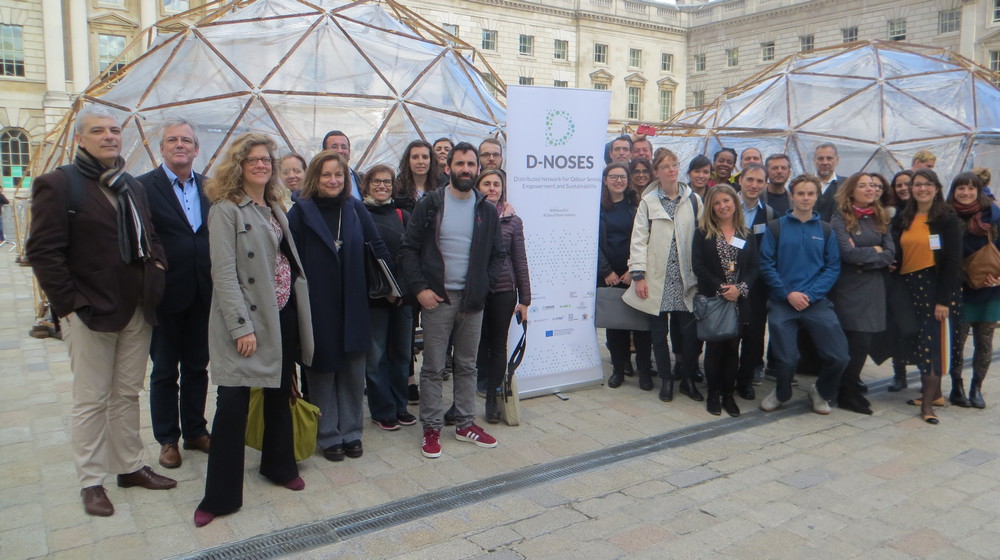
Zaragoza, Spain, 3rd May 2018 – The EU-funded D-NOSES project held its kick-off meeting on the 25th & 26th April 2018 at the University College London campus. The project consortium, coordinated by the Ibercivis Foundation (Spain), is a world-class partnership comprising 15 partners, which combine experts in Responsible Research and Innovation (RRI), citizen science and co-creation, international associations, odour scientists, and includes universities and SMEs, local administration and public bodies from 9 countries.
Across Europe, odour pollution is the second biggest reason for citizens’ environmental complaints, after noise. Frequent exposure to odour is associated with headaches, stress and respiratory problems. Lead by the Ibercivis Foundation, the experts in citizen science, and coordinated by the odour expert Rosa Arias, “D-NOSES will demonstrate that odour pollution is an indicator of larger environmental issues. It can affect our health and also contributes to climate change in the case of landfills or livestock facilities”. Due to the lack of regulation, situated technical studies are rarely conducted, so that data on odour pollution is either scarce or difficult to access. Without data, it is difficult for affected groups to prove the impact on their communities and build a case for change.
D-NOSES will provide a solution to this largely neglected problem by reversing the way in which odour pollution problems are commonly tackled; changing the traditional top-down approach to a bottom-up approach. The new method will empower citizens using participatory platforms and tools to help them become drivers of change and will apply a quadruple helix model of social engagement at local, national and global levels. The project will work with affected local communities to co-design citizen science interventions across 7 European and 3 non-European countries. Citizens will use innovative mapping tools to crowdsource data on odour issues and co-create ad-hoc solutions with CSOs, NGOs, local public authorities, odour emitting industries and academia. Through a new International Odour Observatory, D-NOSES will guarantee public access to information on odour pollution, granting affected communities across the world the opportunity to take action on their own.
Advocacy actions, together with project results, such as DIY Guidelines for project replicability, scientific guidelines for policy making and The Green Paper on Odour Pollution, will be used as policy tools with the ultimate goal of introducing odour pollution into the policy agenda. A ‘Strategic Roadmap on Odour Pollution’ will pave the way for bottom-up, multi-level governance for increased sustainability in the medium to long-term.
The D-NOSES consortium combines the expertise of 15 partners from 9 countries:
• 4 of them from RRI, creation & citizen science experts: Ibercivis Foundation (coordinator, Spain), Ideas for Change (Spain), Mapping for Change (UK), European Citizen Science Association (ECSA).
• 3 International Associations: Mediterranean Information Office for Environment, Culture and Sustainable Development (MIO-ECSDE), International Solid Waste Association (ISWA), International Association of Environmental Odour Managers (AMIGO).
• 5 odour, environment and sustainability experts: Politecnico di Milano (POLIMI), University of Kassel (DESEE), Portuguese Association of Environmental Engineers (APEA), Environmetrics (ENV), Ecotrec (ECO).
• 3 local public administration and public bodies: Sao Joao da Madeira Municipality, Municipality of Sofia, Intermunicipal Waste Management of Greater Porto.
The project will run for 3 years and receives 3.158.612€ funding from the European’s Union Horizon 2020 Science with & for Society Call (SwafS) under grant agreement No. 789315.
Contact
For more information, please contact the Project Coordinator Rosa Arias at rarias[at]bifi.es (Ibercivis Foundation) or by phone at +34 670 031 291